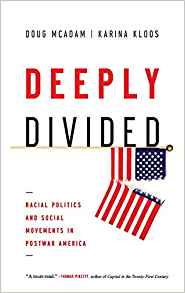 Doug McAdam and Karina Kloos, Deeply Divided: Racial Politics and Social Movements in Postwar America (New York: Oxford University Press, 2014), 396pp.
Doug McAdam and Karina Kloos, Deeply Divided: Racial Politics and Social Movements in Postwar America (New York: Oxford University Press, 2014), 396pp.
With the election of Barack Obama in 2008, some people hoped for a post-racial or "color blind" era that would moderate our political partisanship and address economic inequalities. But the opposite has happened. According to McAdam and Kloos, "the country is now more starkly divided in political terms than at any time since the end of Reconstruction and more unequal in material terms than roughly a century ago and greater, even, than on the eve of the Great Depression." Their book explores how and why this has happened.
Not too long ago, centrist politics were viewed as a problem and not a solution. In 1968, for example, the third party candidate for president George Wallace complained that there was hardly any difference between Democrats and Republicans. Or, to take another example, it used to be standard wisdom for candidates to appeal to their partisan bases in the primaries but then to seek the centrist vote for general elections. This began to change with the 1980 election.
The unique contribution of this book is that it moves beyond the analyses of political parties and institutions to the importance of social movements, both left and right, as a driver of American politics. These social movements — like the civil rights movement, or the subsequent white backlash, exerted a "centrifugal pressure" on American politics. They "began to force the parties to weigh the costs and benefits of appealing to the median voter against the strategic imperative of responding to mobilized movement elements at their ideological margins." A recent article in the New York Times made this exact point — that some Democrats now want to "win it all," whereas others in their party would be happy to make a centrist appeal and just win anything.
In particular, McAdam and Kloos pay special attention to race and region, and how they interact with social movements, to impact our politics. Consider a place like West Virginia. For about seventy years it was a strongly Democratic state. One thinks of Robert Byrd or Jay Rockefeller. But since the 2000 election of Bush, it has voted Republican in every presidential election, and in 2016 every single county voted for Trump. Similarly, there are the recent books by the conservative JD Vance (Hillbilly Elegy) on Appalachia, and the liberal Arlie Hochschild about Louisiana (Strangers in their Own Lands: Anger and Mourning on the American Right).
But then comes a discouraging paradox — whereas this movement toward political partisanship does characterize our political parties, activists, and elites, it does not characterize the general public. On any number of issues, like health insurance, defense spending, or abortion, the general public has favored centrist positions for over thirty years. In fact, we see any number of polls that show how disgusted and discouraged people are about partisanship and government dysfunction.
Doug McAdam is the perfect person to untangle this Gordian knot in the time of Trump. He is the Ray Lyman Wilbur Professor of Sociology at Stanford University and the former Director of the Center for Advanced Study in the Behavioral Sciences. He is the author or co-author of 18 books and some 85 other publications in the area of political sociology, with a special emphasis on race in the U.S., American politics, and the study of social movements and “contentious politics.” He was elected to membership in the American Academy of Arts and Sciences in 2003.


